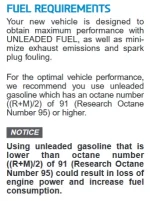PMCErnie
Ancient ‘steemed Member
- Joined
- Jan 2, 2012
- Messages
- 5,937
- Reaction score
- 1,274
- Points
- 113
- Location
- Richmond, VA
- Genesis Model Type
- Genesis GV70
The car lovers social network
Automotive components
Create videos that captivate
Automotive Hot or Not
Vehicle hacker protection
Genesis parts & accessories
Advertise with us!
The car lovers social network
Automotive components
Create videos that captivate
Automotive Hot or Not
Vehicle hacker protection
Genesis parts & accessories
Advertise with us!

I guess Genesis and the EPA are idiots for basing their fuel economy and performance figures on premium fuel then. Surely, you know better than them.Here’s the fuel requirements page of the G90 manual (3.3 turbo & V8). 87 is suggested, allowed, authorized, recommended. Who says the 2021 G80 will have any different fuel requirements?

"Less performance" - Yea, would definitely expect that. But it may not be noticeable depending on one's driving style.Putting regular in them is not recommended, but can be done. Just don't complain when you get less performance, lesser fuel economy, and your engine wears out faster.

Thank you, Mr. Moderator (NOT). Who died and made you the overseer of graphics standards here?I guess Genesis and the EPA are idiots for basing their fuel economy and performance figures on premium fuel then. Surely, you know better than them.
And please learn to crop your images properly.
Speaking of manuals, the one for the G70 more or less tells you to use 91 octane premium and above, with the same consequences I mentioned before for not doing so.
View attachment 29001
"Less performance" - Yea, would definitely expect that. But it may not be noticeable depending on one's driving style.
"Lesser fuel economy" - Maybe, maybe not. Again, depends on one's driving style.
"Engine wears out faster" - Don't think so.
We now return you to the Backslack and PMCErnie show......

Hmm...Thank you, Mr. Moderator (NOT). Who died and made you the overseer of graphics standards here?
Does the G70 manual also say you can use non-premium?
I'm trying to interpret but just not sure. Using lower octane would result in less power. We agree on that. Since it has less power it is subject to less internal forces. If that is true, would it not extend the life? Would having less power put some other strain on the engine?As for engine wear, that's up to you to interpret. But putting cheaper fuel in performance-oriented GDI turbo engines is not a practice that encourages longevity.
I say "for you to interpret" because it's not mentioned in the manual. There are dozens of articles about GDI engines, turbo engines, premium fuel, and knock sensors you can look up.I'm trying to interpret but just not sure. Using lower octane would result in less power. We agree on that. Since it has less power it is subject to less internal forces. If that is true, would it not extend the life? Would having less power put some other strain on the engine?
Rather than leaving it up to us to interpret and opinions that mean nothing, I'd like to see some test data or real information. Thank you for the good information you can provide.
In other words, you don’t know.I say "for you to interpret" because it's not mentioned in the manual. There are dozens of articles about GDI engines, turbo engines, premium fuel, and knock sensors you can look up.
Many cars today have knock sensors, so they are only recommended to run premium instead of outright requiring it like they used to. The turbo engines in the Genesis are designed for performance and not economy like what you would find in a hatchback. That means they're designed for high pressure compression. Putting in lower octane fuel designed to detonate at lower pressures will cause pre-ignition, which may damage the engine. This is even more notable nowadays due to the GDI fuel injection, which can lead to Low Speed Pre-Ignition. Knock sensors will usually detect this before anything to severe happens, but they are not a perfect solution. Let's not forget the debacle Hyundai had in 2015 with their GDI engines.
To put it simply, the smaller and more powerful the engine, the higher the compression, and the more need for higher octane fuel.
Says the guy who can't read the manual he cited.In other words, you don’t know.
We’ll await your post of the 2021 G80 manual.Says the guy who can't read the manual he cited.

We had a thread in the GV80 section about the number of speakers in it, and Ernie was as equally entertaining in that thread as this one.Shall I start a thread on synthetic vs. dino oil? or maybe one on proper shape of exhaust tips?
Sigh..... subscribed for entertainment value

